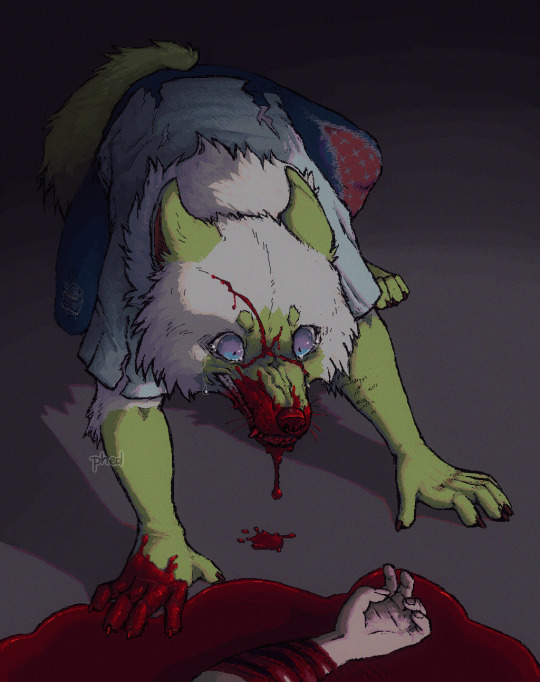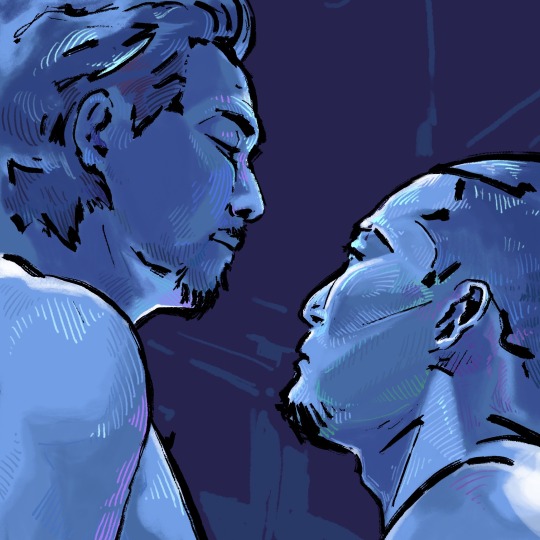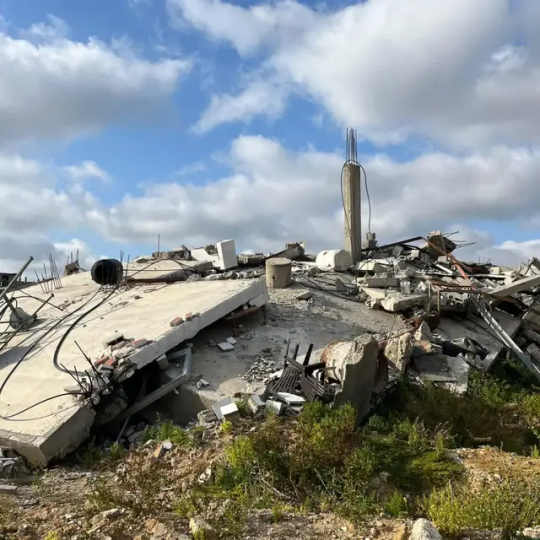#power struggle 2023
Text


40 notes
·
View notes
Text
Jon Moxley vs. Great-O-Khan, NJPW Power Struggle 2023, November 4, 2023
I haven’t found much to latch on to in Great-O-Khan’s (GOK) in-ring work during his excursion, in his current run in New Japan Pro Wrestling, or in his matches in Revolution Pro, so I had high hopes that pairing him with the always intense, always fascinating Jon Moxley would help me understand the claims about GOK’s potential. There’s no one better to make someone look great and inject a match with intensity (usually through Moxley’s overused shortcut of making himself bleed), and it proved to be the case here as well. Their brawling outside without regard toward the referee’s count and Moxley’s demand that he won’t be satisfied until he had taken a chunk of GOK’s soul cranked up the heat under this match’s boil. My attention drifted a bit after they restarted since GOK battering Moxley with plastic barriers didn’t seem that impressive. However, they got my attention back with the image of Moxley’s blood pooling on the floor of Osaka’s Edion Arena and their submission exchange on the floor, and they had it in a death grip when Moxley sent GOK tumbling down the bleacher steps. Ending the match after a Death Rider on the floor instead of taking it back to the ring capped this very unique-feeling walking brawl.
#pro wrestling#wrestling#puroresu#puro#njpw#jon moxley#great o khan#power struggle#power struggle 2023
0 notes
Text




#jon moxley#wrestlingedit#aewedit#njpwedit#aew#aew x njpw#njpw#njpw power struggle#event: power struggle 2023#ours: gifs#maker: s#tw: blood#tw: flashing gif
262 notes
·
View notes
Text
DPxDC Prompt: The Child Who Was King
(For anybody who has read my DPxDC fics you might know that I'm a huge fan of the "Unaging Danny" headcanon and this was directly inspired by that)
------
The team has already heard about Phantom in one way or another. Yes, the tyrant "Pariah Dark" had his name mentioned in some places but it was called the "Phantom Zone" for a reason. "Phantom Zone", "Land of the Dead", "Underworld", "Limbo" and countless other names are listed and describe the same place.
It also describes a King be it vicious or kind, old or young, a threat or a peace keeper. The stories are so varied that it's impossible for the League to know who to expect when they receive a mysterious sticky note which falls from the sky during the meeting.
Soon.
The entire League is on edge, not knowing what to think until some members (Zatana and Constantine) recognize the symbol on the paperwork from ancient texts. The Symbol of the God of Time. Zatana says that Time works close with the King of Death and is send to bend at his will and often sends warning messages like this to alert those who are required to know. While Constantine just wants to leave before things get to be any more of a headache.
Days turn into weeks.
Weeks into months.
Most of the team thinks it was a mistake but one member of the team stays particularly on edge because the paper fell in front of them specifically. It isn't until they're on patrol in their area that another note appears with an address and a time and when they arrive in the area they make it just in time for a green portal to open and somebody to fall out of it.
They react, years of training tell them to catch the figure and when they do they discover a child no older than 14 under weight, pale with black hair and blue eyes, bruises covering them. They're breathing heavily as the kid leans against the heroes chest fearfully, the cape seeming much larger than them.
The hero doesn't know what to think when one final note appears.
Due to reasons which can not yet be discussed King Phantom is not safe in the Land of the Dead, you are here by entrusted with his protection. If you fail all will be lost.
#dcxdp#ngl I picture the hero being Batman but it could be any here#I just love the batfam#Bruce struggles to explain himself when he gets home#because like what do you say?!#sorry Alfred I would have warned you but this kid litterally dropped into my lap#Danny wakes up in the human realm for the first time in what is *hundreds* of years if not thousands for him#just to find out that it's only 2023 and then he's just like 'this is bullshit'#then when Bruce tells the League what happened and introduces Danny they're shook because “this child is the god of death? Very funny Bruce#Danny is also just trying to remember how to be a person#he also has to relearn that he has to actively use his powers to fly here because it's not the ghost zone where he just *floats* eveywhere#the amount of times he has stepped off of something high or fallen face down on the ground because he forgets gravity exists drives him nut#the siblings start keeping a “days since Danny last face planted” counter.
267 notes
·
View notes
Text



Go Onger / RPM Jacket Swaps ❤️💙💛💙❤️
#go onger#engine sentai go onger#power rangers#rpm#i did it i drew the main 3s#sosuke my beloved i will never get sick of drawing youuuuuu#also i dont think i'll ever draw scott without eka darville's labret piercing at this point its as good as canon in my head#summer is the big sister saki DESERVED but drawing her was a struggle i did NOT deserve tbh#does it bother me that summers jacket is different to everyone elses??? yes. Is her jacket still cute tho?? yeah.#*whispers very softly* the blue bus boys get along like a house on fire#now the real question is do i draw the gold and silver duos or do i quit while i'm ahead lol#go on rpm#2023 art tag
94 notes
·
View notes
Text
flirting with the line (and then i crossed it)
The moment Van Palmer walked into the class reunion in a suit and a smile, Tai could tell the night was a certain kind of doomed.
(A fill for Taivan Week 2023, "Adult Timeline Saturday")
E, 12.4k words
“How long has it been?”
Tai almost doesn’t recognize her voice. Almost can’t stomach the rough, sandpapery quality of it. How could this be her? How could this be Taissa Turner: carefully controlled, carefully modulated at all times?
It can’t be explained. She only knows that the words have left her dry lips, plummeting to flatten themselves on the table between them, and that the blue eyes narrowing across from her are too knowing.
“You don’t want to hear about that,” Van says coolly.
#fanfiction#yellowjackets#taivan#taivan week 2023#taivanweek2023#yj fic#taissa turner#van palmer#adult timeline saturday#your honor their adult dynamic is fucked up and glorious and i simply had to pay homage#is it a power struggle? are they stupid in love? is it a bad idea? thanks for asking! yes!#and i love them so much for it#these absolute disaster soulmates#anyway like i said. until they fuck nasty in canon as we all deserve (especially them) i'll be over here#doing my thing
38 notes
·
View notes
Photo

[ID: a drawing of a werewolf crouching beside a pool of blood. the werewolf has blood on their muzzle and right hand, and a bleeding cut across their face. they’re terrified and upset. the only visible part of the victim’s body is their left arm, which has extremely deep claw wounds. End ID]
the path werewolves walk sure is painful (link to speedpaint in reblog)
#werewolf#blood#gore#ms paint#my art#2023#08/02/2023#3000#I JUST NOTICED. the shadow from the dead persons hand is incomplete#also dont pay too much attentionto hands i struggled with them a lot i just hope theyre believable enough#also the only reason i did not put my trademark vhs effect on this is because all the blood details would get blurred#and im very happy with how blood turned out#and the shading. man im so proud of the shading here#i did not use any gradients or soft brushes for it and yet it looks like i did. very powerful#(this is scheduled so if i forget to reblog it with the speedpaint link my youtube channels name is timo dlugiewlosy)#wilkołak
68 notes
·
View notes
Text

2023 is coming to end, and i got a shit ton of art done! It's definitely been one of my more productive years with art, even when i had to spend a few months without a functional laptop. I'm hoping 2024 will be even better for me!
#art summery 2023#my art#kinda nuts to me how much art ive gotten done compared to the last few years#i remember at times i would struggle even getting one drawing done in a month. now im posting something like. every week#i think the fact ive become a lot less of a perfectionist has helped. and im overall just in a better place!#with the power of autism i will continue to draw so much bullshit
15 notes
·
View notes
Text

Did you guys like that Jake Lee vs Yuki Yoshioka match
#Jake Lee Big#yuki yoshioka little#I swear to god I loved this match for more than cumbrained reasons#it was genuinely really interesting watch Yosh have to cope with a wrestler so much larger than him#in DG he’s used to being on the larger side of the roster#and he can rely on his brute strength to give him an advantage#but against someone HUGE like Jake he really doesn’t have much of a strategy#in that way he’s almost at more of a disadvantage against Jake than one of his smaller roster members#because someone like Dia or Dragon Kid know how to fell giants because basically everyone is bigger than they are#so when Yoshioka just sort of goes for Jake’s legs when the match begins all he does is struggle and exhaust himself#wasting precious time and energy that I think costs him the match in the long run#because by the time he remembers that his primary advantage is that he’s a speedy Dragongate boy with explosive striking power#it’s kind of too late#Jake Lee#Yuki Yoshioka#Dragongate#pro wrestling Noah#Noah N1 Victory 2023
15 notes
·
View notes
Text



#taiji ishimori#njpw#njpw power struggle 04/11/2023#dishesgifs#flashing lights#white geaarrrr#he looked pretty
10 notes
·
View notes
Text

Midori One Day One Page 226!
Himeko, Pokota, and Erika from Hime-chan no Ribbon!
Commission Sale!
#midori one day one page 2023#hime chan no ribbon#everything is A Struggle the past few days but I suspect it's just because I'm at an eyes > hands stage of development again#powering through!!
12 notes
·
View notes
Text
The audience for this post is not actually on this website, but the fact that the "It's a D23 year, Marvel is definitely skipping Hall H" argument is a thing every single D23 year when Marvel skipping has literally never actually had anything to do with whether or not it's a D23 year is so deeply unserious 😭.
#since 2012 they've only skipped three times (not counting the two years of virtual cons due to covid)#2015 was because (although not known at the time) ike and Kevin's power struggle was at it's peak#2018 was because they didn't want to show anyone anything from endgame yet#and 2023 was because strike#(and alaqua cox confirmed that they were planning on going pre-strike so 🤪!)#elysia says stuff
4 notes
·
View notes
Text





#jon moxley#shota umino#will ospreay#wrestlingedit#aewedit#njpwedit#aew#aew x njpw#njpw#njpw power struggle#event: power struggle 2023#ours: gifs#maker: s#*#tag team: death riders
280 notes
·
View notes
Text
"Writ writing and prison litigation had shone a light on the abusive discretionary powers of the corrections system and invited the courts to scrutinize the system itself. This strategy prompted deep surveillance within prisons and a flood of administrative reports concerning the Nation of Islam [NOI]. As the group became more prominent in public discussions of race relations and its appeal among prisoners spread more widely, the state developed a framework to justify the continued suppression of Islamic prisoners.
Wardens and state prison guards authorized prison surveillance and in some cases even dedicated a staff member to internal supervision of the NOI. This surveillance was meant not only to absorb and report but also to disrupt and subvert. It provided the raw material for the production of state knowledge that could be used to quell prison activism. That the NOI constituted political subversion under the "guise of religion" became a stock phrase among law enforcement and prison officials. Through its intervention, the state assigned political meaning religious practice, further politicizing incarceration and the practice of Islam within prison walls. The buildup of a carceral state was not simply a top-down response to the gains of outside social movements or a result of federal shifts in political power. The dialectics of discipline between state actors and prisoners often produced these intersecting developments on the ground, which bubbled up to state and national policies.
More accurately than he could have known, Malcolm X wrote in his autobiography that prison officials "monitored what I wrote to add to the files which every state and federal prison keeps on the conversion of Negro prisoners by the teachings of Mr. Elijah Muhammad." Indeed, Commissioner McGinnis requested in 1960 that each prison relay names of all Muslim prisoners to the New York State Police's Criminal and Subversives Section. Within a year, prison inspector Richard Woodward began a series of monthly bulletins highlighting reports from individual prisons, national news on the Nation of Islam, and conference proceedings from the ACA. He then distributed this information to wardens throughout the New York system.
In its earliest form, state surveillance was unidirectional-from prisons to the capital. Disciplinary reports involving Muslims, group associations, names, addresses, and visitation lists were all forwarded to Albany, where they were transcribed and put into individual files with photographs and criminal records. These were in turn sent to the Criminal and Subversives Section. For example, one note from Attica read as follows:
Dear Commissioner:
'A', who was received here by transfer from the Elmira Reformatory and claimed to have no religion.
It has been our experience that prisoners claiming no religion usually gravitate into Muslimism after joining the population.
'C' was received from Greenhaven Prison. He claimed his religion to be Protestant but the record card shows a keeplock for taking part in a large aggressive gathering suspected to be Muslims.
A month after Woodward's bulletins began, he reported that "many clippings have been received on the Muslim activity. They are most welcome." The inspector stressed that "information as to how a situation was handled in one institution may help in other instances."
State surveillance relied most heavily on prison guards, who had daily contact with those imprisoned. One institution devoted a guard to making a list of all active members, searching their cells, and confiscating any literature relating to the NOI. Seized materials slowed the spread of conversions while serving as a source for state intelligence. One area of concern was prisoners' use of Arabic. The language not only had a cultural and religious function, but also stymied prison security. For example, Thomas Bratcher gave specific instructions in his letter to Malcolm X: his mother would write him of the minister's reply in red ink with "Three lines of Al-Fatihab" (referring to Al-Fatiha, the first surah in the Qur'an)." One state report said that it "would seem doubtful if the majority of the prisoners can read and write Arabic but if notes are picked up that seem to contain no meaning they would bear investigating." Two months later, six pages of Arabic to English and English to Arabic translations were confiscated.
Another surveillance strategy that relied heavily on prison guards was the scrutiny of Muslim eating habits and religious rituals. The refusal to eat pork in prisons dated back to incarcerated Muslims during World War II. At Attica, one prisoner was charged with wasting state food for throwing away his bacon. Bratcher wrote to Warden Wilkins asking for permission to carry food from the mess hall to his cell so he and other Muslim prisoners could eat after sundown during Ramadan. At Milan, where Elijah Muhammad had served time during World War II, prisoners took part in a three-day hunger strike against pork, which eventually resulted in Muslim-prepared food and a separate dining section. In California, the warden of Folsom State Prison wrote Attorney General Stanley Mosk and enclosed surveillance photographs taken by a guard. The correctional sergeant described twelve Muslims holding a meeting in the yard on "benches provided for the purpose of playing chess." As the sergeant approached, apparently snapping photos of the congregation, a prisoner proclaimed, "They want to take our picture, so let's give them a good one." Another suggested that they "face the east and pray to Allah." The group of twelve men then lined up facing east, with their hands raised waist high and palms facing the sky while one prisoner conducted prayer.
Prison officials challenged these actions, quickly seizing on dietary restrictions as a way to assess the legitimacy of a prisoner's religious beliefs. A memo from Attica stated:
In order to check the authenticity of the Muslims, each guard has been required to submit to the principal keeper's office The members who are eating pork will be... included in next month's a report on whether or not the particular prisoner in question is eating.
Several months later, another institution counted the Muslims who would not eat when pork was served in the mess mall.
Of the above total (of 70), 30 prisoners either refused their ration or gave it to another prisoner, and [an] additional 16 prisoners took their ration to their cells and only two were actually observed fasting.
Prison officials watched and recorded other religious rituals. SaMarion was charged with making "unnecessary noise" and "sloshing water around in the cell" at 5:15 A.M. despite this likely being part of his ablution and morning prayer, or fair. By monitoring prisoners eating, writings, and literature, prison guards acted as foot soldiers in the state's surveillance and persecution of Muslim prisoners.
Surveillance continued at the state and federal levels long after release. When a Muslim prisoner was paroled, the state police assigned to a subversive unit in that area would be informed "so they could keep track of him." They would also contact the parole guard so they could surveil his "activities in behalf of the Cult, both inside and outside of State institutions." If an NOI member was sent back to prison, the guard was required to immediately notify the commissioner. When Thomas Bratcher was paroled in 1964, agents at both the FBI and the BOSS were alerted and asked to run his name through their systems.
By the mid-1960s, the Nation of Islam had a presence in major prisons from coast to coast, and the network of state surveillance expanded nationally alongside it. California had estimated a little over one hundred Muslim prisoners in the early 1960s, and New York nearly three hundred, with some prisons reporting over a quarter of Black prisoners as Muslim. Just a few years later, this number nearly doubled in New York and quadrupled in California. Some prisons began outlawing membership in the NOI, and one even established a rule prohibiting more than two Black prisoners from congregating together. The emergence of the NOI as a chief concern of prison officials is well documented in the proceedings of the ACA. Donald Clemmer, noted penologist and defendant in the Muslim religious rights case Fulwood v. Clemmer, and sociologist John M. Wilson were the first to present on the NOI at the ACA's conference in 1960. Richard Woodward quoted extensively from Clemmer's presentation in his monthly bulletin alongside a review of C. Eric Lincoln's book. By 1963, topics such as "The Black Muslims and Religious Freedom in Prison" and "The Black Muslim in Prison: A Personality Study" had surfaced as well.
The 1960s marked a profound shift from rehabilitative strategies such as "bibliotherapy"- the use of books and education for therapy - to new technologies of violence and psychological warfare. Solitary confinement and isolation, sensory deprivation, and brainwashing were all proposed and Muslim prison litigation helped to "propel this shift." In 1961, Edgar Schein, a professor of psychology at MIT, presented a paper titled "Man against Man: Brainwashing" as part of a symposium sponsored by the Bureau of Prisons called The Power to Change Behavior. The presentations and ensuing discussion were reproduced in the official journal of the Medical Correctional Association. The conversation that followed Schein's talk immediately honed in on the question of "how shall we manage the Muslims."
Protests against racial persecution were analyzed and medicalized. As Jonathan Metzl documented
psychiatric authors conflated the schizophrenic symptoms of African American patients with the perceived schizophrenia of civil rights protests, particularly those organized by Black Power, Black Panthers, Nation of Islam, or other activist groups.
One doctor recounted that while "many of these Negro Muslims were highly intelligent...We also found that many of them had characteristics of mental disorder of a minimum degree":
We started out with the idea that these were people that formed a group of their own and that we could work with them as a group, and we soon learned that this was impossible and that what we were doing was providing a medium for their kind of illness-group illness to grow and to become more cohesive and even more difficult to work with both as individuals and as a group; and we were in a sense feeding their paranoid behavior so that each step in the direction of their goal resulted in additional demands and additional recruits because they showed strain.
Although the psychologist interpreted the Muslims' response to their situation as a form of paranoia, in essence he and the others at the conference were describing the characteristics of the dialectics of discipline, where greater repression of religious practices and political beliefs led to more resistance from those incarcerated. A group that had once been considered "model prisoners" now represented the vanguard of the prisoners' rights movement and the foremost threat in the minds of prison officials. Bertram Brown, a staff psychiatrist at the National Institute of Mental Health, ended the discussion by directly addressing the audience of prison officials: "We here in Washington are anxious to have you undertake some of these things do things perhaps on your own - undertake a little experiment of what you can do with Muslims."
- Garrett Felber, Those Who Know Don’t Say: The Nation of Islam, the Black Freedom Movement, and the Carceral State. Chapel Hill: The University of North Carolina Press, 2020. p. 70-76
#nation of islam#religion in prison#black freedom struggle#racial segregation#solitary confinement#african american history#those who know don't say#reading 2023#prisoners' rights movement#prisoner resistance#prisoner organizing#circulation of surveillance#psychiatric power#psychiatric control#failure of rehabilitation#new york prisons#california prisons#pathologization of resistance
1 note
·
View note
Text
Help Ashraf's Family Escape Gaza Genocide🌿❤️
Vetted by @gazavetters , my number verified on their list( #74 )
Vetted on X platform on this spreadsheet (#391)

I'm Ashraf from the war-torn Gaza. I've lived an entire life under siege in Gaza, facing relentless military actions and life-threatening conditions daily. In October 2023, the conflict escalated drastically, devastating my newly built house, my neighborhood,my workplace, and jeopardizing the lives of my family.



I mourn the loss of our safe haven, but more urgently, I need to secure a future for my family away from the constant threat of bombings that have become our grim reality.


Meet Yamane, our precious seven-month-old. Who was born during this war, We aspire to provide him with opportunities that surpass our own experiences, fostering a future filled with joy and prosperity.

This campaign is a call to arms for all who believe in the transformative power of community support. By contributing, you're not just donating; you're actively shaping Yamane's world, ensuring his journey is filled with the promise and potential every child deserves. Join us in making a profound impact on his life
Yamen... he's only a baby. He doesn't understand the fear that grips us, the darkness that engulfs our lives. He just smiles, his eyes bright with innocent wonder, oblivious to the terror that surrounds him. He reaches for me with tiny hands, his laughter a fragile melody in this symphony of destruction. 💔
But how long can this innocence last? How long can we shield him from the reality of this war? How long can we keep him safe? 😥
Another side of this war
No gas. No electricity. It's just the cold, empty space where a stove should be.

It's a cruel irony that the war, which has already taken so much from us, has also taken away the warmth of a home-cooked meal. We are forced to rely on makeshift methods, the flickering flame of a makeshift stove fueled by wood or charcoal, a testament to our resilience, and our determination to survive.
The wood crackles and pops, spitting sparks that dance like fireflies in the gloom. It's a dance of desperation, a desperate attempt to coax warmth and nourishment from the ashes of our former lives. Each meal is a battle, a struggle against the elements, the hunger, and the uncertainty of the future.
We boil water in rusty pots over open fires, the smoke stinging our eyes, the fumes filling our lungs. We bake bread in makeshift ovens built from clay and debris, the aroma of baking dough a faint reminder of better days.

But even with these meager resources, we persevere. We cook, we eat, we share. We find solace in the act of preparing a meal, a reminder that even in the face of adversity, life continues. Yet, the weariness lingers, the weight of the war pressing down on us like a heavy cloak. We yearn for the simple normalcy of turning on a stove, of cooking a meal without the fear of smoke inhalation, of the comforting hum of a refrigerator.

The war may have taken away our electricity and gas, but it has not taken away our spirit. We will continue to cook, to eat, to survive.
We will continue to fight for our right to a life of peace, of prosperity, of simple joys. And when the darkness finally lifts, when the smoke clears and the city breathes again, we will remember the lessons we learned in the shadows.
We will remember the strength we found in adversity, the resilience of the human spirit, and the enduring power of a simple, home-cooked meal.
Please help me secure a future for my family away from the constant threat of bombings that have become our grim reality. We are immensely grateful for any support you can provide. It’s more than a donation—it’s a lifeline.
Vetted by @gazavetters, my number verified on their list( #74 )
Vetted on X platform on this spreadsheet (#391)
#save palestine#free palestine#palestinian genocide#i stand with palestine#palestine gfm#ceasefire#ceasfire now
1K notes
·
View notes
Text

Arfight attack on my friend Hosh, a couple less than holy angels
#af 2023#my art#furry#angel#fallen angel#my ocs#digital art#i used all my power to make this right off the bat and now im struggling
1 note
·
View note